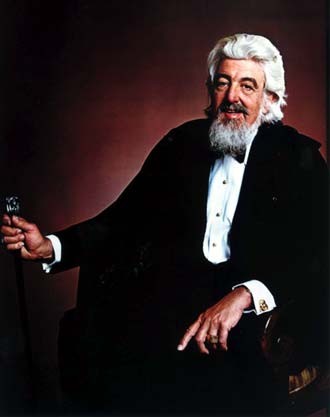| Theater and opera patron Robert L.B. Tobin funded the Tobin Endowment and the Tobin Foundation for Theatre Arts in his will, expressing a desire to, "continue our family's dedication to supporting the advancement and enrichment of the arts in the various communities to which our life's work has been devoted." |
When wealthy arts patron Robert L.B. Tobin died on April 26, 2000, local arts agencies, and theater organizations in particular, were pleased to find he hadn't forgotten them in his will. In a city with comparably little corporate and foundation support for the arts, only three local foundations specify an interest in funding theater. Two of those are the Tobin Foundation for Theatre Arts and the Tobin Endowment. Both include this language on their IRS filings: "Grant requests having specific focus on the theatrical arts, namely theater and opera stage, set and costume design are encouraged."
Yet local theaters have seen very little in the way of support from either organization. The Foundation, with assets of $23.5 million, has given less than $50,000 to local theater companies since 1999. The $56.2 million Endowment has funded one local arts endeavor in that same time period: a $25,700 grant to the Lyric Opera of San Antonio in 2002.
Although Robert Tobin was "hounded out of public life here, a victim of the politics of innuendo," as editor Robert Rivard wrote in the San Antonio Express-News shortly after Tobin's death, the heir of the Tobin Aerial Surveys fortune maintained his family ties to San Antonio after he left the city for more congenial climes. His will, signed at his home in Santa Fe, set up what promised to be a $100 million endowment with an expected $5 million annual outlay for theater-related programs. Even more exciting were reports that most of the grants would stay in San Antonio. "The Tobins were from San Antonio, and we're trying to continue all their philanthropic goals," J. Bruce Bugg Jr., co-trustee of the Tobin Endowment, told the Express-News in April 2001.
In 1999, the existing family foundation dissolved after distributing its assets to the two new organizations: the Tobin Foundation for Theatre Arts, a private operating foundation with a mission to enhance and preserve the Tobin Collection of Theatre Arts at the McNay Museum, and the Tobin Endowment, created to fund the Tobin Foundation in perpetuity.
On February 17 of this year, nearly four years after Tobin's death, the trustees for the Tobin Endowment, Bugg and Leroy G. Denman Jr., filed a list of Texas assets for the estate totaling $38.7 million. This filing comes at a time when public scrutiny of management of the Endowment has finally caught up with similar concerns that have been brewing within the local arts community. Theater organizations have been the most vocal, though none will go on the record biting the hand they still hope will one day feed them.
| In at least two cases, local theater organizations say they have waited for more than a year to meet with the trustees or receive a response to an application. |
The Tobin Endowment might have broader ability to support San Antonio theater, but its track record is poorer. Private charitable foundations are required by federal tax law to spend at least 5 percent of their assets on an annual basis. Some salaries and administrative expenses are considered qualified expenditures, satisfying the 5 percent payout requirement. Critics maintain that this caveat allows foundations to observe the letter of the law while violating its spirit.
In its first three years of operations, the Tobin Endowment reported total expenses and disbursements representing between 3 and 6 percent of its total assets. Each year, the Endowment makes a grant to the Tobin Foundation that comprises about half of the Endowment's giving. Trustee salaries comprise about half of the Endowment's total operating and administrative expenses.
While the grants to the Tobin Foundation are mandated by trust documents, trustees' salaries have been questioned here and elsewhere. The Boston Globe ran an article in December asserting that Bugg and Denman's annual compensation, $295,580 each, is excessive. James R. Dublin, a spokesman for Bugg and Denman quoted in the article, argues that fees are based on Frost National Bank's trustee fee schedule, per Tobin's wishes. Frost's fee schedule provides for a fee of .5 percent on an estate with assets over $5 million. Bugg and Denman each take the full .5 percent, effectively charging the estate twice what Frost would for the same service. Bugg has explained that he saves the estate money by handling its investments himself, and both claim to put in a full 40 hours per week in the service of the Endowment. But some local non-profits have pointed out that those 40-hour weeks apparently don't include time to meet with them on pending grant applications. In at least two cases, local theater organizations say they have waited for more than a year to meet with the trustees or receive a response to an application.
| Tax returns for the Tobin Endowment, whose records indicate they have made one grant to a local theater company since its founding: $25,700 to the Lyric Opera of San Antonio in 2002. |
But local arts agencies, particularly theater organizations, who were promised grants focused on San Antonio and promoting theater arts, see evidence of neither emphasis. Recent large grants to the San Antonio Academy (Bugg has a child who attends), the Southwest Foundation for Biomedical Research (Denman is a Trustee Emeritus), the Cancer Therapy and Research Center and KLRN (Bugg joined both boards in 2001) raise questions. Tobin's niece, Anne Tobin Maessen, has publicly questioned whether the trustees, in awarding grants, are guided by Tobin's interests or their own, claiming that they are using the assets "to enhance their own social and personal standing in San Antonio."
Bugg, who is on record as having said "our grant-making doesn't represent our personal preference, but Robert Tobin's interests," denies having broken faith with his former employer. The SA Academy grant was a naming opportunity representing Tobin's love for books, Bugg explains. Both trustees say that Tobin became interested in funding scientific and medical research in his last years. "The Trustees of The Tobin Endowment hope that by assisting the CTRC in building the Robert L.B. Tobin Imaging Center, future patients of CTRC will avoid the hardships endured by Robert from the effects of his cancer," says Bugg in a CTRC press release.
The skeptical may be forgiven for wondering how Tobin, who described himself as a Yellow Dog Democrat, is best represented by Bugg, identified by Texans for Public Justice as a Pioneer fundraising network volunteer for Bush in 2000. Bugg was also a broker of the controversial 2003 deal to bring the Dallas Cowboys to the Alamodome for 21 days every summer and pay them $400,000 for the privilege. Then again, Tobin was a diehard Cowboys fan. •
Bugg could not be reached for comment before deadline.



